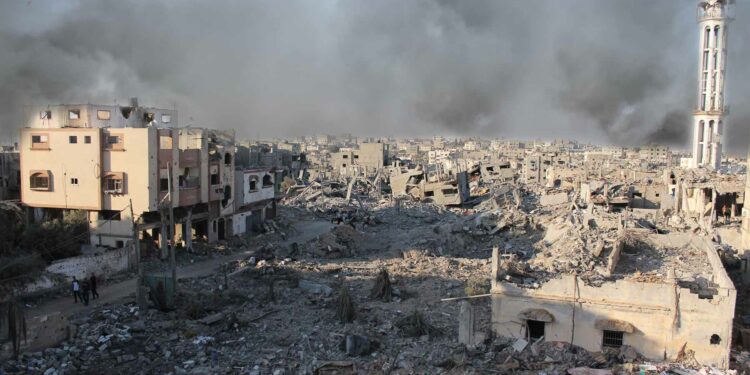The diplomatic return of a President Bashar al-Assad-ruled Syria is expected to be on the table during the 2023 Arab League summit in May, after more than a decade of the state’s exclusion from the body. The League suspended Syria’s membership in 2011, shortly after Assad’s brutal crackdown on demonstrators during the Arab Spring and before the country descended into a full-scale war, with Arab states following suit by severing diplomatic ties. Now, after more than a decade of bloodshed, during which Assad has maintained his grip on power, it appears the region may be paving the way for diplomatic normalization. However, it remains unclear whether this process could provide a window of opportunity for peace, through potentially allowing for more effective communication between conflicting parties, and foreign investment to rebuild Syria, or whether it might embolden Assad’s regime to maintain its stance of rejecting political engagement with its rivals, and ignoring human rights violations.
The recent diplomatic moves come on the back of military gains by Assad’s forces, and mark a major shift in the region’s approach to the regime. The United Arab Emirates (UAE), and Bahrain, were among the first to reestablish diplomatic ties with Syria. Now key regional powers, many of whom previously supported the Syrian opposition – such as Saudi Arabia, Egypt, and Turkey – are taking steps toward rapprochement with Assad’s government.
While rapprochement may well operate as a strategic response to manage compelling regional issues, such as drug trafficking and the displacement of millions of Syrians into neighboring countries, it could further thwart the aspirations of the Syrian people who participated in the Arab Spring. In addition, it might push the United Nations (UN) further to the margins of mediation efforts and undermine its mandate for an inclusive process for political change.
The elusive quest for UN mediation in Syria – what went wrong?
Some of the world’s most capable UN mediators have largely failed to bring about a lasting political solution to the conflict in Syria. The roots of this failure lie in an unfavorable and divisive context, characterized by polarized international politics in the United Nations Security Council (UNSC), as well as the warring parties’ unwillingness to pursue meaningful paths to conflict resolution, due to the ongoing military and diplomatic support from regional and international allies.
The diplomatic stalemate in Syria can be traced back to a combination of internal and external factors, perhaps the most important of which is the fact that the warring parties have showed little interest in engaging in meaningful negotiations since 2011. This has been further compounded by the fact the Assad government believed that it could quash the opposition through military means, while his opponents have clung to the hope of receiving external support.
The six-point peace plan of 2012 and the Geneva Communiqué
Mediation efforts relied then on external pressure to push the parties to the table. The late, former UN Secretary-General Kofi Annan, who was jointly appointed an UN-Arab League Special Envoy, developed a six-point peace plan in 2012 aimed at ending the violence and initiating a political transition in Syria, which the national parties rejected. Amid entrenched positions and deep-rooted mistrust among the national parties, Annan turned to international powers to gain leverage and pressure them to engage in negotiations. Consequently, the Action Group on Syria, including UNSC permanent members, agreed on the Geneva Communiqué, which called for an inclusive political transition with representation from all parties. However, the thorny issue of Assad’s departure remained, leading to international divisions regarding how the conflict could be resolved. While preserving the Syrian regime became key for Russia, the United States insisted that “Assad Must Go.” This antagonistic stance between two of the world’s superpowers became apparent in the UNSC when Russian and Chinese vetoes blocked the Communiqué.
Conflict management and Geneva II
As the second Special Envoy Lakhdar Brahimi took over, the mediation strategy, at an internal level, cautiously followed a conflict management approach focused on short-term solutions to reduce tensions and the immediate negative effects of the war, rather than resolving its underlying roots. As the war escalated and parties’ mistrust seemed insurmountable, Brahimi focused, albeit unsuccessfully, on making small humanitarian gains upon which to build a broader ceasefire at the internal level, while pressuring external sponsors to cease support for the conflict, as did his predecessor. Noting the US-Russia rapprochement on Syria in 2013, Brahimi built on this momentum to celebrate the first peace conference, known as Geneva II, that would bring together the national parties. Nonetheless, no progress was made.
Russian backing of Assad changes the game
Special Envoy Staffan de Mistura’s appointment in 2014 marked the commencement of a different mediation strategy. Instead of attempting to broker a broad-based political settlement, De Mistura focused on establishing local ceasefires and building trust between opposing sides at the grassroots level as a basis for a renewed Geneva. That proved a mission impossible as neither side wanted to give up the chance of a military victory. However, Iranian support and the Russian military intervention in 2015 gave the Assad regime the upper hand and altered the course of the conflict.
In response to the Russian involvement in the conflict and the declaration of a caliphate by the Islamic State, the International Syria Support Group, co-chaired by the United States and Russia, convened in Vienna and produced a comprehensive plan for the resumption of peace talks. This plan was eventually endorsed in UNSC Resolution 2214 (2015) which renewed the call for a ceasefire and the formation of a unity government. Several rounds of peace talks in Geneva between 2016 and 2017 proved futile, leaving De Mistura with little scope to mediate.
Disputes over constitutional reform
Lastly, De Mistura pushed for the formation of a constitutional committee to draft a new Syrian constitution. While this de facto committee significantly reduced the initial mandate for a transition aligned with the democratic aspirations of the Arab Spring in Syria, the Constitutional Committee was also seen as a potential gateway for the full implementation of UNSC Resolution 2254. As such, after intense negotiations with the Astana Guarantors – Turkey, Iran, and Russia – the Syrian opposition, and its regional backers, the Constitutional Committee was formed in 2019 under the auspices of the current Special Envoy, Geir Pedersen. Despite being a significant milestone, the Constitutional Committee has reached a stalemate after several rounds of discussions. Disagreements between the Syrian government and the opposition over the scope and content of constitutional reform seem to have lost relevance against the backdrop of the Assad regime’s apparent military victory.
Could normalization of ties with Assad be the final blow for UN mediation?
The Syrian conflict has been a diplomatic labyrinth, with UN mediators facing a seemingly impossible task with no exit to the conflict in sight. At the internal level, the parties have shown little willingness to compromise, while external pressures have only polarized the conflict, leaving the UNSC paralyzed with little muscle to persuade parties toward negotiation. Mediators were sent on a suicide mission, tasked with finding a way out of a complex web of interests and demands that have left Syria in turmoil. The failure of the Constitutional Committee is just the latest example of the difficulties faced by those seeking to end the conflict.
As Western powers and some regional states resist normalizing ties with Assad, the broader implications of this regional shift are yet to be seen and it is not clear whether these efforts will ultimately contribute to a more effective peace process in Syria. Overall, the impact of normalization on the peace process in Syria will depend on a variety of factors: the extent of such normalization; how regional states balance regional stability and political demands; and the response of Assad’s regime, will all play integral roles in determining the trajectory in possible resolutions or ends to the conflict.
The uncertain future of normalization with Syria
A breakthrough in the peace process may be possible if normalization efforts are carefully orchestrated. By capitalizing on the regional diplomatic momentum and recent reconciliatory agreements between Saudi Arabia and Iran, which are already showing some positive signs in Yemen, key regional players and parties’ backers could enhance the peace process. Regional players could do this by coordinating the scope, trade-offs, and consequences of normalization and as such, incentivize Assad to accept some political settlement or even advance trust-building files, such as the detainees, forcibly disappeared, and missing file. However, resistance to these moves could be significant due to the complex and deeply-rooted nature of the conflict, regional disagreements in defining what normalization entails, and also Assad’s demonstrated reluctance to budge on any form of reconciliation that is seen to threaten his hold on power.
In another scenario, if normalization occurs without any significant push for political concessions from the Assad regime, this macro-regional process could exacerbate an already fragile peace mediation process, leaving even less margin for the implementation of the UN’s mediation mandate. Efforts to restore the Assad regime are contradictory with UNSC Resolution 2254 made in 2015, which outlines a political transition to democracy with full respect for human rights. Thus, normalization represents a dangerous concession that sends a message the international community is willing to overlook the Assad regime’s atrocities, allowing him to consolidate power while rejecting any meaningful political change. For the UN-brokered mediation process, this could give Assad less reason to join even pro forma the work of the Constitutional Committee. In fact, with an increasingly polarized international community, the prospect of relying on Russian pressure to coax the regime into compromise pro forma to mediation seems no longer an option.
Normalization is already a setback to the Syrian-owned, Syrian-led political transition that inspired the Geneva Communiqué. However, normalization without giving priority to accountability and human rights, would send a message that regional stability should come at any cost and would thus effectively shut down the path toward achieving a legitimate and sustainable peace in Syria that is accepted by all parties.
Jusaima Moaid-azm Peregrina is a Syrian-Spanish scholar and researcher at the University of Granada in Spain, who teaches Comparative Politics and Political Systems and Regional Dynamics in the Middle East. Her research focuses on international mediation and political change processes, civil society inclusion, and women’s political participation, with a particular emphasis on Syria. She is currently co-leading a research project on women’s inclusion in Syria, Libya, and Yemen.







